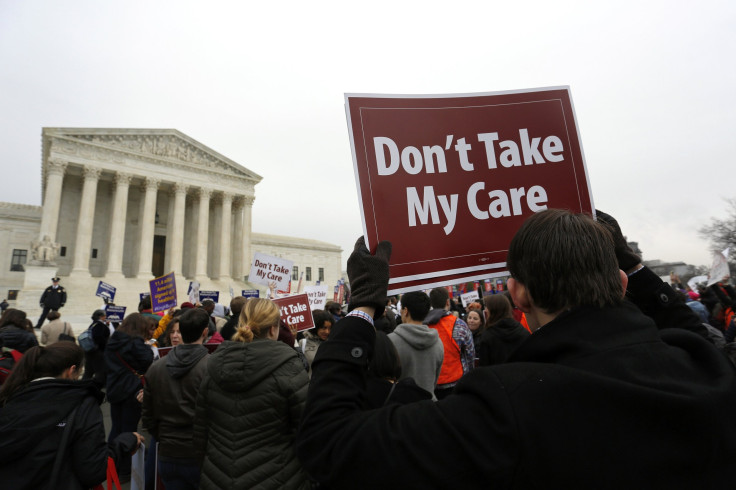King v. Burwell Obamacare Case: When Supreme Court Will Decide And What Happens Next To Health Care Law

The U.S. Supreme Court could rule as early as Friday on whether the federal government broke the law by applying a certain provision of the Affordable Care Act, or Obamacare, too broadly, but the results of such a decision would likely not be made public until May or June when the court’s current session ends. If the court were to side with the law’s challengers, it wouldn’t dismantle Obamacare entirely, but would certainly land a devastating blow to millions of Americans who currently receive federal subsidies to help them afford health insurance.
The justices heard arguments in the case, known as King v. Burwell, Wednesday, but gave little indication on which way they were leaning. After more than an hour of arguments from both sides, the Supreme Court appeared divided, with Chief Justice John Roberts, considered the potential swing vote in the case, giving no hint on which side of the fence he stood. "Roberts, who's usually a very active participant in oral arguments, said almost nothing for an hour and a half," Jeffrey Toobin, CNN's Supreme Court analyst, said Wednesday. When Obamacare faced its first major hurdle in 2012, Roberts cast the decisive vote that saved the Obama administration’s health care law.
The case hinges on a four-word clause in the Affordable Care Act: “established by the state.” The provision refers to the right of low- and middle-income residents in states running their own online marketplaces, called exchanges, to receive federal tax credits. Only 16 states have chosen to run their own exchanges; the rest defaulted to the federal government’s healthcare.gov. Millions of health insurance buyers in states not running their own marketplaces have received subsidies to make their health care plans more affordable.
Obamacare’s challengers argued Wednesday that such subsidies violate the law’s state provision. If the court were to rule in favor of the law’s challengers, it would mean people living in the 34 states who chose the federal health care exchange would lose their subsidies and probably their coverage.
The lawyer for the law’s opponents, Michael Carvin, said the case was “straightforward” and that the law clearly meant that states on the federal exchange could not receive tax credits. Justice Anthony Kennedy, however, questioned Carvin’s reasoning.
“There’s a serious constitutional problem if we adopt your argument,” Kennedy told Carvin, according to Reuters. He added that “it may well be that you're correct as to these words, and there's nothing we can do.”
© Copyright IBTimes 2024. All rights reserved.






















